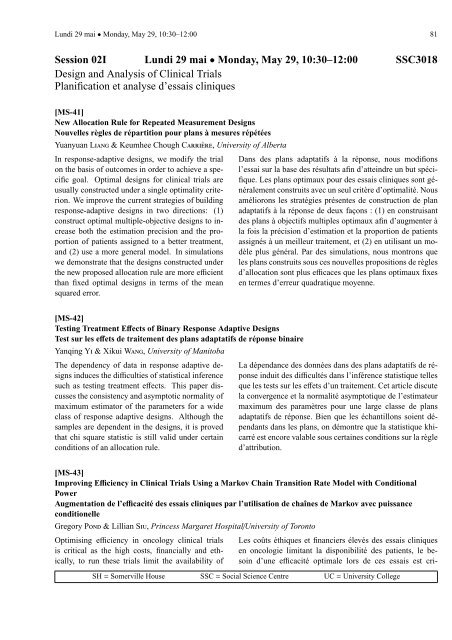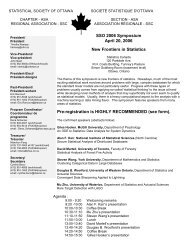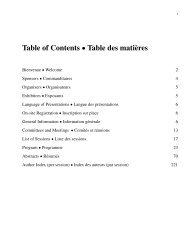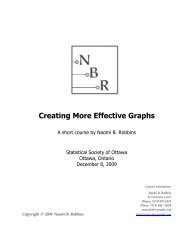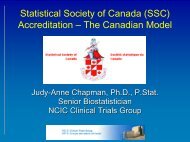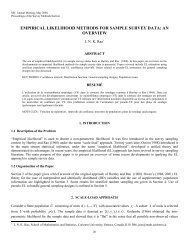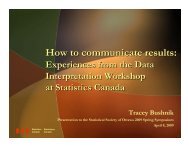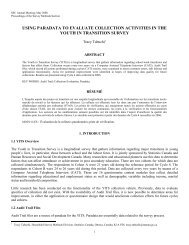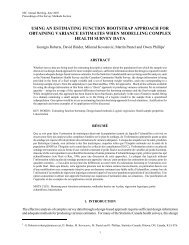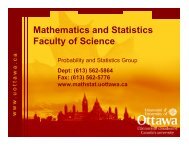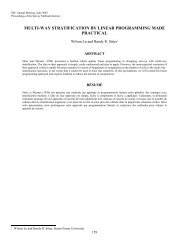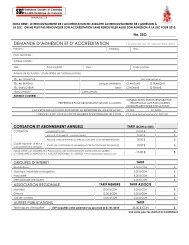Programme et résumés (pdf) - Société statistique du Canada
Programme et résumés (pdf) - Société statistique du Canada
Programme et résumés (pdf) - Société statistique du Canada
You also want an ePaper? Increase the reach of your titles
YUMPU automatically turns print PDFs into web optimized ePapers that Google loves.
Lundi 29 mai • Monday, May 29, 10:30–12:00 81Session 02I Lundi 29 mai • Monday, May 29, 10:30–12:00 SSC3018Design and Analysis of Clinical TrialsPlanification <strong>et</strong> analyse d’essais cliniques[MS-41]New Allocation Rule for Repeated Measurement DesignsNouvelles règles de répartition pour plans à mesures répétéesYuanyuan LIANG & Keumhee Chough CARRIÈRE, University of AlbertaIn response-adaptive designs, we modify the trialon the basis of outcomes in order to achieve a specificgoal. Optimal designs for clinical trials areusually constructed under a single optimality criterion.We improve the current strategies of buildingresponse-adaptive designs in two directions: (1)construct optimal multiple-objective designs to increaseboth the estimation precision and the proportionof patients assigned to a b<strong>et</strong>ter treatment,and (2) use a more general model. In simulationswe demonstrate that the designs constructed underthe new proposed allocation rule are more efficientthan fixed optimal designs in terms of the meansquared error.Dans des plans adaptatifs à la réponse, nous modifionsl’essai sur la base des résultats afin d’atteindre un but spéci-fique. Les plans optimaux pour des essais cliniques sont gé-néralement construits avec un seul critère d’optimalité. Nousaméliorons les stratégies présentes de construction de planadaptatifs à la réponse de deux façons : (1) en construisantdes plans à objectifs multiples optimaux afin d’augmenter àla fois la précision d’estimation <strong>et</strong> la proportion de patientsassignés à un meilleur traitement, <strong>et</strong> (2) en utilisant un mo-dèle plus général. Par des simulations, nous montrons queles plans construits sous ces nouvelles propositions de règlesd’allocation sont plus efficaces que les plans optimaux fixesen termes d’erreur quadratique moyenne.[MS-42]Testing Treatment Effects of Binary Response Adaptive DesignsTest sur les eff<strong>et</strong>s de traitement des plans adaptatifs de réponse binaireYanqing YI & Xikui WANG, University of ManitobaLa dépendance des données dans des plans adaptatifs de réponsein<strong>du</strong>it des difficultés dans l’inférence <strong>statistique</strong> tellesque les tests sur les eff<strong>et</strong>s d’un traitement. C<strong>et</strong> article discutela convergence <strong>et</strong> la normalité asymptotique de l’estimateurmaximum des paramètres pour une large classe de plansadaptatifs de réponse. Bien que les échantillons soient dé-pendants dans les plans, on démontre que la <strong>statistique</strong> khi-carré est encore valable sous certaines conditions sur la règled’attribution.The dependency of data in response adaptive designsin<strong>du</strong>ces the difficulties of statistical inferencesuch as testing treatment effects. This paper discussesthe consistency and asymptotic normality ofmaximum estimator of the param<strong>et</strong>ers for a wideclass of response adaptive designs. Although thesamples are dependent in the designs, it is provedthat chi square statistic is still valid under certainconditions of an allocation rule.[MS-43]Improving Efficiency in Clinical Trials Using a Markov Chain Transition Rate Model with ConditionalPowerAugmentation de l’efficacité des essais cliniques par l’utilisation de chaînes de Markov avec puissanceconditionelleGregory POND & Lillian SIU, Princess Margar<strong>et</strong> Hospital/University of TorontoOptimising efficiency in oncology clinical trialsis critical as the high costs, financially and <strong>et</strong>hically,to run these trials limit the availability ofLes coûts éthiques <strong>et</strong> financiers élevés des essais cliniquesen oncologie limitant la disponibilité des patients, le be-soin d’une efficacité optimale lors de ces essais est cri-SH = Somerville House SSC = Social Science Centre UC = University College


